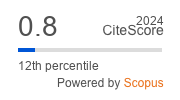Low-energy electron beam irradiation effect on Al/SiO2/Si structure voltage-farad characteristics
https://doi.org/10.17073/1609-3577-2019-2-112-117
Abstract
The effect of electron irradiation with energy of 2.5 keV on the MOS structure Al/SiO2/Si capacitance-voltage (C-V) characteristics have been studied. At chosen beam energy the electron penetration depth is lower than the dielectric thickness that allows to reveal the contribution of excess carrier transport to the trap formation on the SiO2/Si interface. It was established that the electron beam irradiation leads to a significant change in the C-V characteristics slope, i.e. to to the trap formation at the interface. A study of effect of bias applied to the investigated structure before and during the electron beam irradiation was carried out. It was established that while the bias applied before irradiation practically did not affect the C-V characteristics of the investigated MOS structure, the positive voltage applied to metallization during irradiation produced a pronounced effect on the C-V curve changes. At the same time the C-V characteristics after irradiation with zero and negative voltage were very similar. The investigation of stability of changes produced by the electron beam irradiation showed that the C-V curves are slowly restored even at room temperature. An applied negative bias was found to slow down the charge relaxation process.
About the Authors
Yu. O. KulanchikovRussian Federation
IPTM RAN,
6, Academician Ossipyan Str, Chernogolovka, 142432
P. S. Vergeles
Russian Federation
IPTM RAN,
6, Academician Ossipyan Str, Chernogolovka, 142432
E. B. Yakimov
Russian Federation
IPTM RAN,
6, Academician Ossipyan Str, Chernogolovka, 142432
References
1. O. Jbara, M. Belhaj, S. Odof, K. Msellak, E. I. Rau, M. V. Andrianov. Surface potential measurements of electron-irradiated insulators using backscattered and secondary electron spectra from an electrostatic toroidal spectrometer adapted for scanning electron microscope applications. Rev. Sci. Instrum., 2001, 72, 1788-1795.
2. J. Cazaux. Scenario for time evolution of insulator charging under various focused electron irradiations. J. Appl. Phys., 2004, 95, 731-742.
3. G. Di Santo, C. Coluzza, R. Flammini, R. Zanoni, F. Decker. Spatial, energy, and time-dependent study of surface charging using spectroscopy and microscopy techniques. J. Appl. Phys. 2007, 102, 114505.
4. O. Jbara, S. Fakhfakh, M. Belhaj, S. Rondot, A. Hadjadj, J. M. Patat. Charging effects of PET under electron beam irradiation in a SEM. J. Phys. D: Appl. Phys., 2008, 41, 245504.
5. N. Cornet, D. Goeuriot, C. Guerret-Piecourt, D. Juve, D. Treheux, M. Touzin, H.-J. Fitting. Electron beam charging of insulators with surface layer and leakage currents. J. Appl. Phys., 2008, 103, 064110.
6. H. Fitting, X. Meyza, C. Guerret-Piecourt, C. Dutriez, M. Touzin, D. Goeuriot, D. Treheux. Selfconsistent electrical charging in insulators. J. Europ. Ceramic Soc., 2005, 25, 2799–2803.
7. M. Belhaj, O. Jbara, M. N. Filippov, E. I. Rau, M. V. Andrianov. Analysis of two methods of measurements of surface potental of insulators in SEM: electron spectroscopy and X-ray spectroscopy methods. Appl. Surf. Sci., 2001, 177, 58-65.
8. Э. И. Рау, А. А. Татаринцев, С. Ю. Купреенко, С. В. Зайцев, Н. Г. Подбуцкий. Сравнительный анализ методов измерения потенциалов зарядки диэлектриков при электронном облучении в сканирующем электронном микроскопе. Поверхность. Рентгеновские, синхронные и нейтронные исследования, 2017, № 10, 69–76.
9. Э.И. Рау, А.А. Татаринцев, Е.Ю. Зыкова, И.П. Иваненко, С.Ю. Купреенко, К.Ф. Миннебаев, А.А. Хайдаров. Электронно-лучевая зарядка диэлектриков, предварительно облученных ионами и электронами средних энергий. ФТТ, 2017, 59, 1504-1513.
10. Э. И. Рау, Е.Н. Евстафьева, М.В. Андрианов. Механизмы зарядки диэлектриков при их облучении электронными пучками средних энергий, ФТТ, 2008, 50, 599-607.
11. T. R. Oldham, F. B. McLean, Total Ionizing Dose Effects in MOS Oxides and Devices, IEEE Trans. Nucl. Sci., 2003, 50, №3, 483-498.
12. J. R. Schwank, M. R. Shaneyfelt, D. M. Fleetwood, J. A. Felix, P. E. Dodd, P. Paillet, V. Ferlet-Cavrois, Radiation Effects in MOS Oxides, IEEE Trans. Nucl. Sci., 2008, 55, №4, 1833-1853.
13. D. K. Schroder, Semiconductor materials and device characterization, 3rd edn. Hoboken, New Jersey, John Wiley & Sons, Inc., 2006, pp.781.
14. С.С. Борисов, П.С. Вергелес, Е.Б. Якимов. Исследование индуцированной электронным пучком проводимости в тонких пленках окиси кремния. Поверхность. Рентгеновские, синхронные и нейтронные исследования, 2010, № 9, 62–66.
15. I. A. Glavatskikh, V. S. Kortov, H.-J. Fitting, Self-consistent electrical charging of insulating layers and metal-insulator-semiconductor structures. J. Appl. Phys., 2001, 89, 440-448.
16. G. Groeseneken, R. Bellens, G. Van den Bosch, H. E. Maes. Hot-carrier degradation in submicrometre MOSFETs: from uniform injection towards the real operating conditions. Semicond. Sci. Technol., 1995, 10, 1208-1220. 17. A. Acovic, G. La Rosa, Y.-C. Sun. A review of hot-carrier degradation mechanisms in MOSFETs. Microelectr. Reliab., 1996, 36, 845-869.
17. D. Vuillaume, A. Bravaix, and D. Goguenheim, Hot-carrier injections in SiO2, Microel. Reliab., 1998, 38, 7-22.
18. M. Cho, P. Roussel, B. Kaczer, R. Degraeve, J. Franco, M. Aoulaiche, T. Chiarella, T. Kauerauf, N. Horiguchi, and G. Groeseneken, Channel Hot Carrier Degradation Mechanism in Long/Short Channel n-FinFETs, IEEE Trans. Electron Dev., 2013, 60, 4002-4007.
19. A. J. Lelis, T. R. Oldham, H. E. Boesch, Jr, F. B. McLean, The nature of the trapped hole annealing process, IEEE Trans. Nucl. Sci., 1989, 36, 1808-1815.
20. M. Schmidt, and H. Köster Jr, Hole Trap Analysis in SiO2/Si Structures by Electron Tunneling, Phys. Stat. Sol. (b), 1992, 174, 53-66.
Review
For citations:
Kulanchikov Yu.O., Vergeles P.S., Yakimov E.B. Low-energy electron beam irradiation effect on Al/SiO2/Si structure voltage-farad characteristics. Izvestiya Vysshikh Uchebnykh Zavedenii. Materialy Elektronnoi Tekhniki = Materials of Electronics Engineering. 2019;22(2):112-117. (In Russ.) https://doi.org/10.17073/1609-3577-2019-2-112-117





































